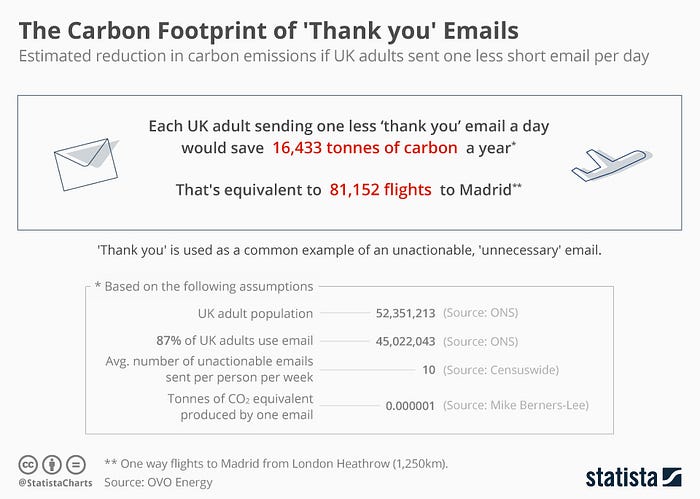Rethinking Tech With Sustainability In Mind
Whether it’s taking a drive to the grocery store, flying somewhere, shopping or firing up the grill to cook some (vegan) sausages — everybody on earth is responsible for releasing carbon dioxide into the air. This is called our carbon footprint. We all have one, and those of us who are environmentally conscious work hard to reduce it.
We’ve stopped using plastic straws, we recycle, we try our best to drive less, etc. Little by little we are helping to combat climate change. Unfortunately, this is not enough. Did you know we also have a digital carbon footprint? Even doing things like using the internet (like yours truly) adds to it. And this kind of carbon footprint is generating a lot of debate these days.
Even though the internet’s data is invisible, it is still processed and stored in data centers all over the world and these centers have to be up and running 24/7. We’ve become so used to having digital content at our fingertips that most of us don’t even think of how it affects the environment. Here’s one example:

Is Digital Pollution As Bad As Actual Pollution?
Another example, let’s take streaming a movie online in comparison to using an electric car. The amount of electricity used to stream a two-hour video on a laptop (including network and server usage) is roughly as much as it takes for an electric car to drive 0.6km (who would have thought?). This is only one example and is enough cause for concern.


Some climate activists argue that an activity like online gaming can be compared to flying while others believe that this is an extreme take on it. Because it’s difficult to measure, let’s take a look at what science says. Ericsson did some research on the impact of the ICT industry on the environment. They found that carbon emissions from the digital realm affect the climate in two ways:
- Carbon emissions created by ICT equipment manufacturing, maintenance, and disposal.
- Indirect effects of using ICT for things like optimization of transport and travel substitution, and its impact on our societal lives.
The report revealed that, if all electricity came from renewable sources, the ICT industry’s carbon footprint could be reduced by more than 80% when it comes to manufacturing, disposal, and usage of equipment. On a positive note, while the way things are now has a negative impact on the environment, the indirect effects of ICT (point 2) are mostly positive. This means we can use the internet for good.
How To Use The Internet To Help The Earth
The internet is where many of us, and I among them, learn about environmental challenges. It’s also where we find useful tools to help lower the impact we make as individuals and businesses; tools like online carbon footprint calculators and useful green guides on how to change our habits to help the environment (i.e. food). Not to mention using social media to create awareness of climate change and how we can combat it.
What can we do as individuals? Here are some ideas:
- Consume more consciously — When buying digital devices, think about whether the product was made ethically. It’s not easy to find products that were produced with a low impact on the environment and using fair treatment of employees, but this market is growing. Try to see if you can source Shiftphone or Fairphone products.
- Avoid electronic waste where possible — We are living in times where we replace our devices instead of repairing them or even long before they stop working. Consider keeping your old device until you really need a new one, and then, maybe even buying a second-hand device.
- Dispose of gadgets responsibly — Don’t throw digital waste out with ordinary household waste. It is hazardous and could end up in a landfill where it contaminates the water or soil. If it still works, sell it or donate it. Otherwise, find a way to recycle it, most cities have facilities and some even offer a pick-up service.
- Stream less, download more — A lot of the traffic on the internet is created by streaming. Netflix alone consumes a huge percentage of internet traffic in the world — around 15%! Downloading movies, shows and music will reduce your data usage and lets you keep what you want to watch again.

- Moderation is the key — Using the internet in moderation is not only good for the planet, it’s also good for your mental health. Forget about looking at your social media streams every five minutes, rather set a limit on how much time you spend on it — and stick to it! Go outside, have a walk, and get some sunshine and fresh air instead.
- Switch Google for Ecosia — The more people search on Ecosia, the more trees they plant. This eco-friendly search engine uses as much as 80% of its profits to plant trees in regions where it’s needed. No offense Google.
- Adjust your settings — Turn your devices off when you’re not using them, and where you are, lower the monitor brightness. If you turn a monitor down from 100% to 70%, you will save as much as 20% of the energy it uses. This also reduces eye strain.

- Get bored — Instead of grabbing your phone every time you have a break from your daily life, take a real break. Watch people, daydream, and really look at what’s going on around you. You may even find that life is not boring at all without your phone!
Can We Save Our Planet With The Internet?
Well, we need a lot more than the internet to combat climate change. But we probably cannot save it without the help of the internet. Our challenge is to try to make our digital carbon footprint as low as possible and offset what’s left of it through our ICT usage by using its various platforms to educate others about environmental responsibility. It may seem like a small action, but it all adds up. Remember when we didn’t even know what recycling was? Just a few years ago nobody thought of turning the tap off when they brush their teeth, using electric vehicles or composting waste. Things are changing in the world and what seems like small actions now will ultimately lead to bigger changes.
